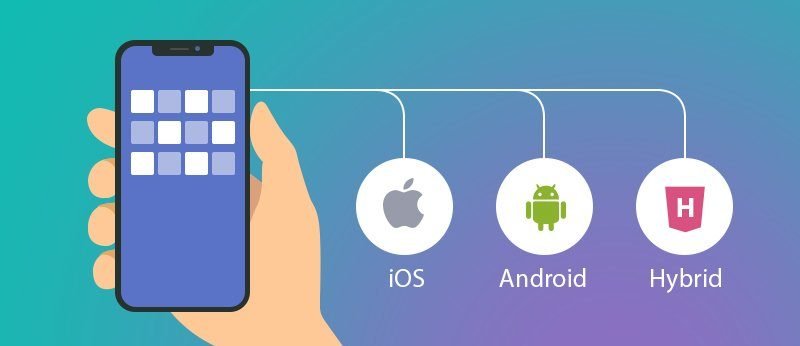Hybrid applications bridge the gap between native and web technologies, offering seamless user experiences across platforms. They optimize performance, development time, and user satisfaction, addressing multiple challenges in software development.
Understanding Hybrid Applications:
Hybrid applications, as the name suggests, are a blend of native and web applications. They leverage web technologies such as HTML, CSS, and JavaScript to create a single codebase that can be deployed on multiple platforms. This approach enables developers to write the application’s core logic once and then package it as a native app for various operating systems, like iOS, Android, and even desktop environments.
Benefits of Hybrid Applications:
1) Cross-Platform Compatibility: One of the most significant advantages of hybrid applications is their ability to run on different platforms with minimal modifications. This cross-platform compatibility reduces development efforts and allows companies to target a broader audience.
2) Cost-Effectiveness: Developing separate native apps for different platforms can be expensive and time-consuming. Hybrid applications significantly cut down on costs since a single codebase can be utilized for various platforms, streamlining the development process.
3) Faster Development: Time-to-market is crucial in the software industry. Hybrid applications expedite development by enabling developers to work on a single codebase. This agility is particularly beneficial for startups and businesses with limited resources.
4) Access to Native Features: Hybrid applications can access device features like cameras, GPS, and push notifications through plugins or APIs. This integration provides a native-like experience to users while utilizing web technologies.
5) Offline Functionality: Hybrid apps can store certain data offline, ensuring users can still interact with the app even without an internet connection. This feature enhances user engagement and satisfaction.
SEO Optimization and Hybrid Applications:
Search Engine Optimization (SEO) plays a pivotal role in enhancing a digital presence. Traditionally, hybrid apps were considered less SEO-friendly compared to their web counterparts due to their limited interaction with search engines. However, recent advancements have addressed this concern. Search engines are now capable of indexing content within hybrid applications, making them more discoverable to users through organic search.
Challenges and Considerations:
While hybrid applications offer numerous advantages, they are not a one-size-fits-all solution. Some challenges and considerations include:
1) Performance: While hybrid apps can achieve near-native performance, they might still lag behind in certain scenarios, especially graphics-intensive applications or games.
2) User Experience: Although hybrid apps strive to provide a consistent user experience, some variations might occur due to platform-specific behaviors and design guidelines.
3) Dependency on Third-Party Tools: Hybrid app development often involves the use of third-party frameworks or libraries. Changes or discontinuation of these tools could impact the app’s maintenance.
Conclusion:
Hybrid applications have carved out a significant niche in modern software solutions by offering a balanced amalgamation of native and web technologies. Their ability to streamline development, reduce costs, and maintain a consistent user experience across platforms has made them an attractive option for businesses of all sizes. As search engine algorithms continue to adapt, hybrid apps are also becoming more SEO-friendly, further bolstering their relevance in the software landscape. However, developers must carefully assess their project’s specific needs and consider the challenges associated with hybrid development before making a decision.
1. What are hybrid applications, and how do they differ from native and web applications?
Hybrid applications combine aspects of both native and web applications. They are developed using web technologies like HTML, CSS, and JavaScript and then wrapped in a native container. This allows them to run on multiple platforms while offering some of the performance and capabilities of native apps and the flexibility of web apps.
2. What are the main benefits of using hybrid applications in software development?
Hybrid applications offer several advantages, including cross-platform compatibility, cost-effectiveness, faster development cycles, access to native device features, and the ability to provide offline functionality. These benefits make them a compelling choice for businesses looking to reach a wider audience efficiently.
3. Can hybrid applications be optimized for search engines (SEO)?
Yes, recent advancements have made hybrid applications more SEO-friendly. Search engines are now capable of indexing content within hybrid apps, allowing them to appear in organic search results. However, developers need to implement best practices, such as ensuring crawlable content and using proper metadata, to optimize the app’s SEO performance.
4. What challenges should businesses consider when opting for hybrid application development?
While hybrid applications offer many advantages, there are challenges to consider. Performance can be a concern for graphics-intensive applications or complex interactions. Additionally, achieving a consistent user experience across different platforms can sometimes be challenging. Businesses should also be aware of any dependencies on third-party tools that the app relies on for development or maintenance.
5. How should businesses decide between developing hybrid, native, or web applications for their software solutions?
The decision between these options depends on factors such as the project’s budget, time-to-market requirements, target audience, and the complexity of the application’s features. Hybrid applications are a good choice when cross-platform compatibility, cost-effectiveness, and faster development cycles are important. However, if an app requires the highest performance or relies heavily on specific device features, a native approach might be more suitable.


